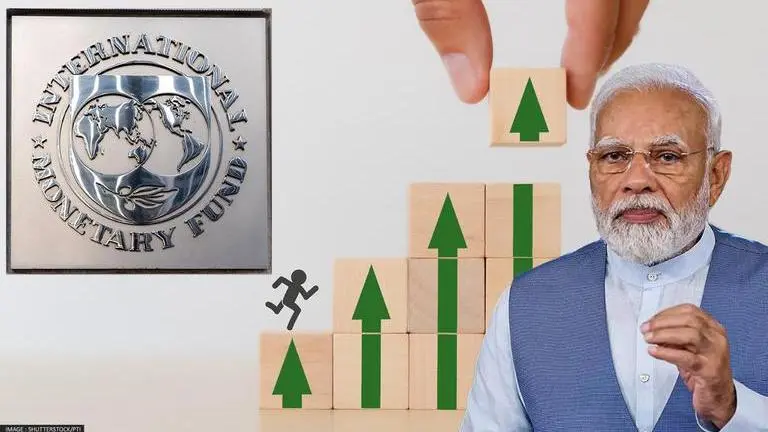Updated 6 April 2023 at 08:42 IST
IMF hails India, says digital transformation underlines lessons for other countries
The IMF hailed India and stated that India's approach to creating a "world-class digital public infrastructure" emphasises the lesson for other nations.
- India News
- 4 min read

The International Monetary Fund hailed India and stated that India's approach to creating a "world-class digital public infrastructure" underlines the lesson for other nations that are starting their own digital transformation.
The IMF stated in its working paper, "Stacking Up the Advantages Lessons from India's Digital Journey," that the development of India's stack is influenced by a focus on encouraging innovation across the ecosystem and a fundamental building blocks approach. Using the building block method, a set of problems is broken down into their component parts, and a minimal common core is found.
The report asserts that a building block strategy gives people who are closer to the issue the fundamental resources they need to develop customised solutions in a diverse nation like India. Supporting a thriving ecosystem implies the requirement for competition-focused design and interoperability amongst the various digital public infrastructures (DPIs). Interoperability in India was facilitated by open standards, enabling anyone to make use of the features offered by India Stack.
"These principles are applied to other DPIs in education and health, including the COVID-19 vaccine and distribution platform, COWIN," the paper read."Using a digital backbone allowed India to scale its vaccine delivery quickly and overcome challenges such as large-scale internal migration. The technology underlying CoWIN has been deployed in Indonesia, the Philippines, Sri Lanka, and Jamaica to help facilitate their vaccination programs," the paper added.
Advertisement
The value of information technology (IT) in the creation of the identification layer has also been acknowledged by India. Prior to the introduction of the Aadhar card, India already had a number of identity cards and databases (such as PAN tax IDs and ration cards), but none offered universal coverage, the promise of uniqueness, or the capacity to support a population of over a billion people.
The nation knew that using technology to create an identification system with scalability, uniqueness, and robustness at a reasonable cost would be essential. The appointment of a successful IT entrepreneur as UIDAI's founding chairman, which signalled the government's commitment to employing technology to address the policy issue, allowed UIDAI to recruit better and more qualified personnel for the task.
Advertisement
Learnings for the implementation of Aadhaar were acquired from the trials and tribulations of the tax ID deployment (e.g., using a novel PPP to speed up enrollments).
Using a common core as a starting point, the digital building block approach separates the components of a solution to a set of challenges.
For instance, in the India Stack, UPI and Aadhaar both remove payment addresses from payments and identification from entitlements, respectively (Mukherjee and Maruwada, 2021).
This modular approach fosters innovation, allowing each building block to address multiple problems, including use cases not envisaged by the initial developer. Focusing on the problem's core also allows each building block to be used at population scale," the statement read."For a large and diverse country such as India, a building block approach provides those closer to the problem with the basic tools to create tailored solutions. In the case of Aadhaar, the unbundling as well as the minimal information collected (name, age, gender, address, biometrics) enabled its rollout at speed and scale. In contrast, other countries have hit stumbling blocks with their digital ID rollout when these IDs convey an entitlement, such as citizenship," the statement added.
Luis E. Breuer, IMF Senior Resident Representative to India, said in a tweet that India's digital public infrastructure is transforming people's lives.
India has built a world-class digital public infrastructure that has lessons for many countries. The latest research by @IMFnews shows how it is transforming the economy and peoples’ lives. https://t.co/IlwtFACYrp
— Luis E. Breuer (@IMF_India) April 5, 2023
Published By : Simran Singh
Published On: 6 April 2023 at 08:42 IST
